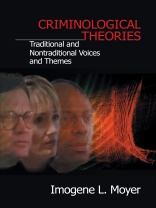As an experienced teacher of criminological theory at graduate and undergraduate levels, Imogene Moyer grew increasingly dissatisfied with the somewhat narrow focus of the books available. In her new text, Moyer has succeeded in presenting instructors and students with a comprehensive and engaging alternative.
Moyer takes a multidimensional approach to the subject by including ‘new’ theorists such as
W.E.B. Du Bois, Pauline Tarnowsky, Frank Tannenbaum, Ruth Shonle Cavan, and Sally Simpson, often allowing the theorists′ original source material to speak for them. Chapters are devoted to recently developed perspectives, particularly from women and people of color, which provide readers with a broader understanding of crime and criminal behavior.
Criminological Theories is organized in a chronological order, beginning with the 18th century classical school ¾ focusing on Beccaria and Bentham ¾ and ending with the late 20th-century peacemaking perspective. In each chapter Moyer analyzes the assumptions the theorists have made about people and society and includes discussions of the cultural and historical settings in which the theories were developed, along with biographies of specific theorists and their lifetime contributions. The theme of the interrelationship theory, research, and policy runs throughout the book, with policy implications and applications frequently addressed.
While it is not essential for all scholars to agree on a particular theory′s value, Imogene Moyer has provided the background and insights necessary to understand and appreciate the diverse and valuable theoretical viewpoints that have contributed to criminology today.
Tabela de Conteúdo
1. The Expansion of Criminological Theory
2. The Classical School
3. The Positivist School
4. The Functionalist Perspective
5. The Chicago School
6. The Control Theorists – Ayn Embar-Seddon
7. The Interactionist School – Cavit Cooley
8. Conflict/Radical Marxist Theories
9. Feminist Criminology
10. Peacemaking in Criminology












